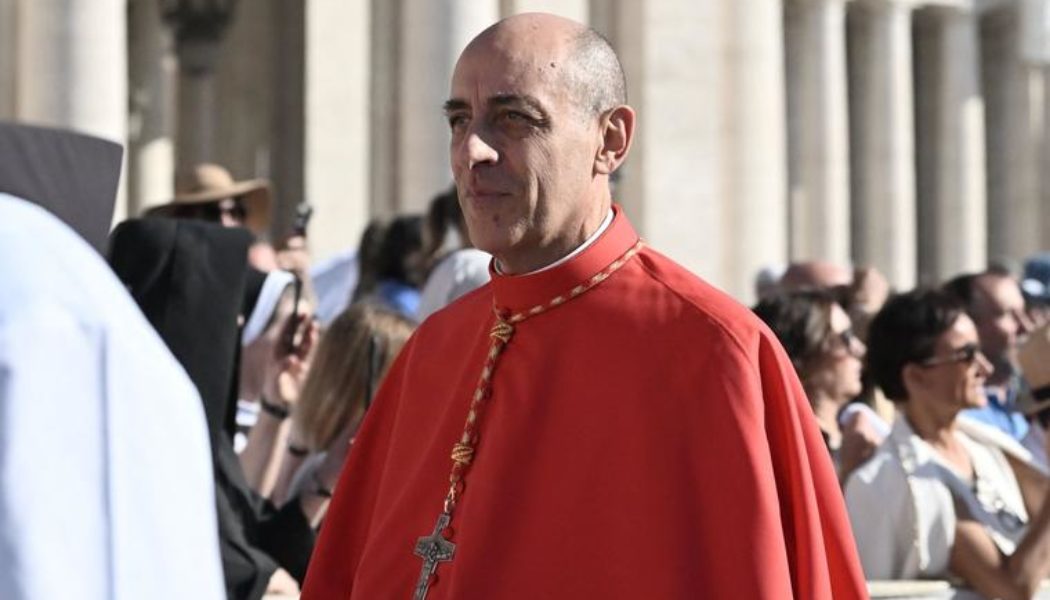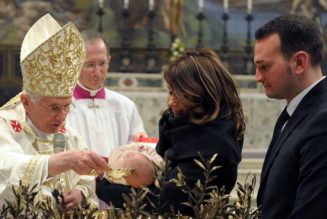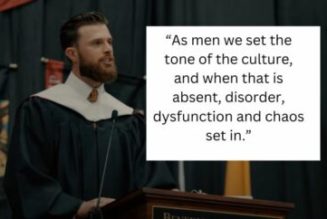
VATICAN CITY — If the Vatican is serious about not allowing its recent controversial guidance on blessings for same-sex couples to lead to further confusion and division in the Catholic Church, experts worry that a vital element is still missing from its approach: enforcement.
Since Fiducia Supplicans was released on Dec. 18, several priests have apparently defied the guidance. While the declaration allows for the possibility of spontaneous, nonliturgical blessings that don’t cause confusion about the Church’s teaching on sexuality and marriage, some priests have offered pre-planned blessings that have been highly publicized, while others have blessed same-sex couples in liturgical settings.
Furthermore, Church leaders in Germany have indicated that they don’t see Fiducia Supplicans as an impediment to their plans to push for doctrinal changes nor to offer formalized blessings of same-sex couples.
However, while Vatican leadership has issued an unprecedented “clarification” of the declaration, and has continued to issue words of warning to Germany, no public actions to correct high-profile abuses of the guidance have been made.
And some Church observers fear that if the Holy See doesn’t take steps to rein in problematic applications and interpretations of Fiducia Supplicans, differences in practice could lead to incompatible understandings of sexuality and marriage, setting the stage for deep divisions in the Church.
In turn, if left unchecked, those divisions could even lead to possible schism, which would involve Catholic bishops formally breaking union with the Pope and the rest of the Church over doctrinal differences.
Dominican Father Pius Pietrzyk, a professor of canon law at the Pontifical University of St. Thomas Aquinas in Rome, told the Register that “it is very likely that unless the Holy See intervenes, some dioceses and even bishops will push further against the accepted ordinary magisterium of the Church in a way that is heretical.”
And if the Holy See does “honor its responsibility to ensure proper discipline, and these bishops ignore that,” the canonist said with specific reference to the bishops of Germany, “then you could see dioceses, mostly in Western Europe, flirting with schism.”
Cardinal Víctor Manuel Fernandez, the head of the Vatican’s Dicastery for the Doctrine of the Faith (DDF) and Fiducia Supplicans’ author, has since said that the controversial guidance is less the cause of division and more a catalyst for revealing fault lines that already exist.
“It’s not that these documents causes divisions, they simply make them emerge, they bring sincerity,” he told the Italian newspaper La Stampa in a Jan. 11 interview.
But critics contend that the Vatican’s unwillingness to correct abuses of Fiducia Supplicans contributes to that division.
“The Holy See’s refusal to enforce its vision of this document exacerbates all of the controversy it has caused,” Father Pietrzyk said.
The clarification issued Jan. 4 by Cardinal Fernández doesn’t necessarily allay those concerns.
Cardinal Fernández’s clarification, which came after the DDF originally asserted that “no further responses” would be given on how to apply Fiducia Supplicans, affirmed that local bishops have the responsibility to discern how to implement the guidance in their jurisdiction.
Several bishops’ conferences in Africa and Eastern Europe have prohibited the blessings in their dioceses, while others in Europe, the United States and Latin America have imposed additional restrictions to avoid scandal, such as requiring that related blessings be performed in private.
Cardinal Fernández also provided guidance for how blessings should be offered in a way that avoids confusion about Church teaching, such as limiting them to “10 or 15 seconds” and not performing them “in a prominent place within a sacred building.”
But nowhere in the 2,000-plus word text did the DDF prefect address the issue of potential abuses or those that have arguably already occurred.
The likelihood of the DDF enforcing its own guidance and correcting abuses of Fiducia Supplicans remains uncertain — especially with Cardinal Fernández at its helm.
While the dicastery traditionally has a role of correcting wayward theologians and clerics, Cardinal Fernández has previously said that he plans to lead the DDF his “own way,” focusing less on ensuring doctrinal discipline and more on encouraging “theological dialogue.”
Until proven otherwise, some commentators are not optimistic that any enforcement is forthcoming.
“Fernández’s press release can clarify all it wants to in theory, but there’s no sign the DDF plans to flex its muscles and ensure the theory is correctly applied — or act against obvious and public misapplications,” wrote canon lawyer Ed Condon for The Pillar on Jan. 5.
Deepening Divisions
Warnings about Fiducia Supplicans’ potential to generate disunity cropped up immediately upon the declaration’s publication a week before Christmas. Hours after its release, German-born Notre Dame theologian Ulrich Lehner described the document as an “invitation to schism.”
Noting the document’s openness to misinterpretation, theologian and Register contributor Larry Chapp said that, without enforcement, Fiducia Supplicans will further contribute to the division of an already “balkanized” Church, with interpretation and implementation varying from parish to parish, diocese to diocese, and country to country.
“This document doesn’t heal any of those divisions,” he told the Register, describing it as intentionally ambiguous. “It certainly is going to increase them.”
In particular, some have expressed concerns that the document’s affirmation of the possibility of blessing “same-sex couples,” as opposed to blessing individuals who may be part of a same-sex couple, implicitly condones the sexual activity that makes two people a couple. Different interpretations of what “couples” refers to — persons or their sexual activity — could lead to divergent emphases in sexual morality on the ground.
For instance, Peruvian Bishop Rafael Escudero López-Brea said on Jan. 2 that Fiducia Supplicans has provoked “unprecedented confusion” and that it “damages the communion of the Church” by “confusingly” suggesting that blessing a same-sex couple, as opposed to individual persons, does not signal approval of their sexual union.
Cardinal Fernández did not address this concern in his clarification. Father Pietrzyk said he can’t understand why the DDF “refuses to accept that this type of critique is possible and has a merit that they should take seriously.”
“They seem to simply sweep aside reasonable questions raised by dozens of bishops and even cardinals, hundreds of priests and theologians and millions of the lay faithful,” he told the Register.
Opus Dei Father Robert Gahl, a moral philosopher and associate professor in The Busch School of Business at The Catholic University of America, emphasized that if Fiducia Supplicans is read in continuity with the Church’s established teaching on marriage and sexuality, “this document does not in itself lead to schism, and it is a faithful interpretation of tradition.”
However, Father Gahl also cautioned that if a local Church or even a bishops’ conference authorized celebrations that “seem to be celebrating same-sex couples in some way,” while others hold true to an interpretation of Fiducia Supplicans consistent with Church teaching, “that certainly would be a significant step towards greater disunity in the Church.”
And while the Opus Dei priest welcomed Cardinal Fernández’s clarification of Fiducia Supplicans, particularly its affirmation that bishops can offer guidance to ensure implementation in a way that avoids confusion, he acknowledged that the assertion that the guidance is in conformity with Church teaching may not be taken seriously by all without matching action.
“Some continue to ask, ‘If there is no change in doctrine, the why does the DDF continue to refrain from denouncing those who are instrumentalizing the declaration to advance sacrilegious blessings designed to condone and approve irregular situations?’”
Apparent Abuses
Father Gahl likely had one particular incident in mind: Jesuit Father James Martin blessing two men who are civilly “married” the day after Fiducia Supplicans was published — with The New York Times on hand to document the occasion.
Although the priest used a general blessing, he had stated the day before his excitement to publicly bless his “friends in same-sex marriages.”
Father Gahl said the blessing, during which the two men were holding hands, was clearly designed “to affirm and condone men having sex with men.”
“The implication here is that Father James Martin is blessing their relationship, not just each of them individually,” said Father Gahl, noting that in the current American context a same-sex couple implies sexual activity.
In fact, one of the two men who received the blessing, Jason Steidl Jack, published an article about the experience on Father Martin’s “Outreach” website days later, initially speaking of “blessings for same-sex unions.” The article was subsequently edited to refer to “same-sex couples.”
Father Pietrzyk seemed to be referring to Father Martin when he spoke of a priest in the United States who has applied the guidance in “a way directly counter the clear words” of the document and “is known to be a friend of the Supreme Pontiff.” Father Martin and Pope Francis have exchanged personal correspondences, and the Pope has received his fellow Jesuit in multiple private audiences.
Given the perceived connection between the two, Father Pietrzyk said local Church authorities may be hesitant to intervene, as that could be taken as an indirect attack on the Pope. Therefore, the Dominican friar said, the Holy See is the only entity that can publicly correct the priest in question.
“Their continued refusal to do so allow his distorted message to remain as the widely received interpretation, especially given the use of his allies in the secular press,” said Father Pietrzyk. “This has left many to conclude that the [DDF] is not, in fact, interested in ensuring a correct interpretation, as its actions do not follow its words.”
Writing in First Things, Catholic commentator George Weigel made a similar critique.
“If the cardinal were truly unhappy with the way his document was being spun, why did he not re-contextualize Fiducia Supplicans (so to speak) by calling out clergy who promptly conducted same-sex ‘blessings’ in a manner that was obviously pre-planned (not least to garner media attention), that was quasi-liturgical, and that unmistakably blurred the doctrinal and moral lines the cardinal claimed his document had drawn?”
German Push
Fiducia Supplicans’ impact on Church unity was not an afterthought in its publication. In fact, Cardinal Fernández has since characterized the declaration as an effort to provide a common path forward for the universal Church on an issue that has threatened to divide it.
In particular, he described the guidance as a “clear message” to “enlightened” German bishops that while informal blessings of couples are permitted, their push to change Church teaching on sexuality and offer formalized blessings couples are not viable.
“It is not the answer that people in two or three countries would like to have,” Cardinal Fernández told the German Catholic newspaper Die Tagespost on Jan. 3. “Rather, it is a pastoral response that everyone could accept, albeit with difficulty.”
But while the cardinal has said that the German bishops “should reformulate their proposal” regarding ritualized blessings, it seems unlikely that without enforcement they will take that as anything more than a suggestion.
On Jan. 4, German Bishop Herwig Gössl, who Pope Francis recently tapped to lead the Archdiocese of Bamberg, said that he thought the Vatican’s permission to bless same-sex couples would have come with a doctrinal shift on the sinfulness of homosexual acts, adding that “this is not the end of the debate.”
Gregor Podschun, who heads a Church-sanctioned federation for German Catholic youth and has a leadership role in the Synodal Way, went further, calling the Pope and the Vatican “misanthropic and discriminatory” for failing to approve same-sex sexual relations in Fiducia Supplicans.
These comments followed a Dec. 20 statement by the leader of a powerful German lay organization that Fiducia Supplicans will not halt plans to develop and distribute formalized texts for blessing same-sex partnerships in Germany.
Birgit Mock, the vice president of the Central Committee of German Catholics, also added that allowing blessings of same-sex couples could eventually lead to a change in Church teaching.
“We’ll have to wait and see,” said Mock. “We have seen in recent years that the Vatican is always good for surprises.”
Action Forthcoming?
Regarding the situation in Germany, Cardinal Fernández said that Vatican leadership “will make all the necessary clarifications” in ongoing meetings with representatives of the German Bishops’ Conference, the next one scheduled for this month.
And in the Jan. 3 interview with Die Tagespost, the Argentinian prelate said that a condition of ongoing dialogue with German bishops is that “we do not continue to make decisions that will only be discussed at further meetings” — suggesting the Vatican will draw a hard line on its prohibition of the kinds of ritualized blessings adopted by the Synodal Way.
Cardinal Fernández said he is also “planning a trip to Germany to have some conversations that I believe are important.”
However, critics continue to caution that words will not be enough to stop abuses and the threat of schism.
Father Pietrzyk said that if the DDF fails to both correct abuses of Fiducia Supplicans and support bishops who crack down on misapplications of it, it “will signify that this is not simply about an expanded notion of the meaning of ‘blessing’ but a deliberate intention to alter the Church’s understanding of marriage and sin.”
“The question of ‘enforcement,’” the Dominican priest said, “will show if the prefect is serious about what he asserts this document to say.”








